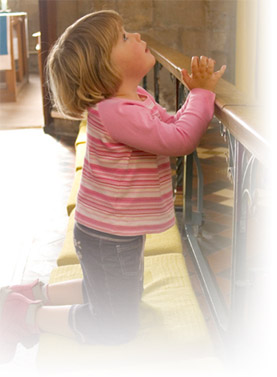Sunday Sermon for December 23, 2018, the Fourth Sunday of Advent, Year C
Readings: Mic 5:1-4a; Heb 10:5-10; Lk 1:39-45
In redeeming the world, God could have done anything He desired. The problem is that He knows His human creatures all too well, which means He knows how difficult it is for us to believe what He says. As all mothers tell their children: actions speak louder than words. We can say one thing and do another, but God cannot. He has told us countless times about His love for us and yet, because of the effects of sin, we have trouble believing it could be true.
We can look at many different passages from Scripture in which God not only tells us He loves us, but He wants us to be united with Him in love. Throughout the Old Testament God uses the image of marriage to convey this point. He wants to be as a husband united with the whole of Israel, the bride. As many times as He revealed this, the Israelites did not accept it. They refused to believe God would actually wed Himself to creatures as lowly as ourselves.
Because His Chosen People would not believe Him, God determined to demonstrate His love. Words did not get through the thick skulls of the people, so He chose to reveal His love with concrete human actions, hoping we would actually believe Him. The way the people of the Old Testament were to show their love for God was through sacrifice and holocaust, but in the second reading today St. Paul puts on the lips of Jesus the verse from Psalm 40 that God does not want sacrifices and offerings, holocausts and sin offerings. Instead, St. Paul has Jesus quoting the same verse, God has prepared a body for Him.
In this way, through a human body, God can now reveal to His people what His love for His Bride, now the Church, looks like. As is customary with God, He works in unexpected ways. Not only does God take a human nature to Himself, something so unthinkable that even the highest angels rejected it, but He accomplishes this through the lowly, the weak, the small.
This is what we see in the other two readings today. In the first reading the Prophet Micah tells us that the Messiah will be born in a place so small that it is not even counted among the clans of Judah. God has chosen to be born in Bethlehem, a tiny, out of the way place no one would have considered. Of course, as we know, the birth took place there, but if anyone was looking for a pregnant woman in Bethlehem who might give birth to the Messiah, the mother was not to be found there until the day Jesus was born. So, in case anyone had thought they had it all figured out, God worked things, once again, in an unexpected manner.
In the Gospel today we hear about our Lady’s visitation to her relative, Elizabeth. The most humble human person ever to live goes to visit an elderly relative who has secluded herself during the time of her very unexpected pregnancy. When Elizabeth received our Blessed Lady’s greeting, the baby in her womb leaped for joy and Elizabeth recognized immediately that Mary was carrying the Messiah, Who was not only a son of Israel, a son of Judah, and a son of David. Elizabeth recognized Him to be her Lord, the Son of God.
Keep in mind that our Lady set out very soon after conceiving the Gift of God in the Incarnation through the power of the Holy Spirit. Jesus would have been only a few days old; in other words, by nature the signs that accompany pregnancy would not yet have presented themselves. If it were not for the extraordinary events that had taken place our Lady would not have known she was with Child. Still, Elizabeth is filled with the Holy Spirit and understands that the Child growing in our Lady’s womb is God.
In a society like ours where human dignity is ignored or dismissed, especially the dignity and even the humanity of the unborn, here we have two unborn children being recognized for who they are. If Bethlehem was too small to be counted among the clans of Judah, a baby only inches long and another only millimeters in size are chosen by God to bring salvation to the world. Once again, God works in hidden and mysterious ways.
This Body and Blood of this newly conceived Child are offered to God in place of sacrifices and holocausts. His whole Person is offered for us so our sins could be forgiven, so we could be united with God. His actions express His words because He is the Word: He loves us and wants us to be united with Him in a marriage covenant of love forever.
Fr. Altier’s column appears regularly in The Wanderer, a national Catholic weekly published in St. Paul, Minn. For information about subscribing to The Wanderer, please visit www.thewandererpress.com.

